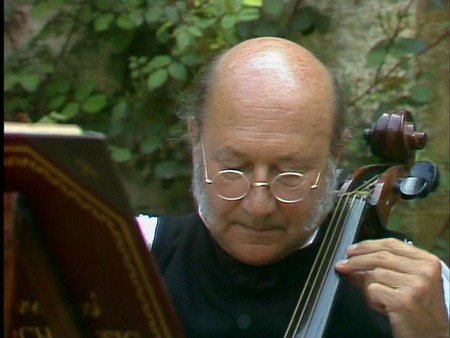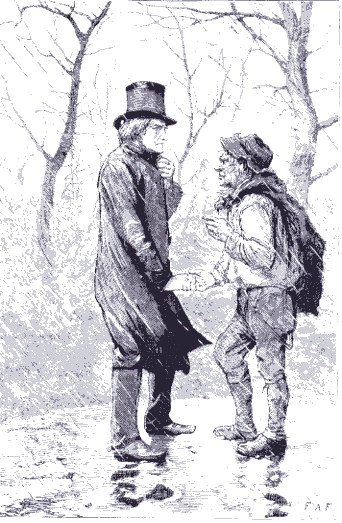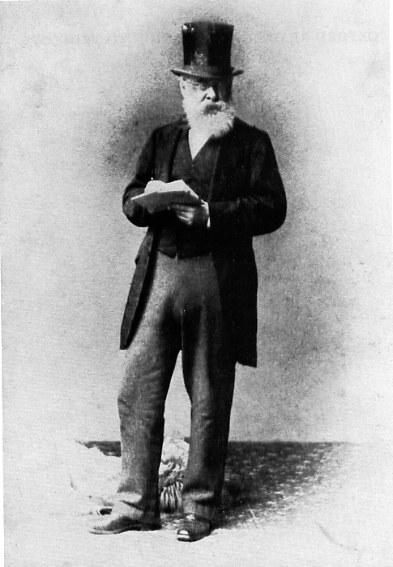|
Trollope19thCStudies (to subscribe click here) is
comprised of people from
different backgrounds who come together to read with and to write to
one another about Anthony Trollope. Michael Powe and Ellen
Moody are listowners and moderators; it was for a long time called Trollope-l and this previous name will be found used in
some parts of this website and Yahoo. Michael founded the list
in October 1997; it has been on several servers and is now located at
Yahoo. The terrain of Trollope19thCStudies is the life and writing of Anthony
Trollope in the context of everything to do with the long 19th century
(1815-1914). We discuss the life and writing of other British,
American, and European writers, this long era's music and art,
history, politics, and science, and later literature and art about it
(including modern films, historical novels, and biographies). The
list is intended to be an ongoing informal cyberspace seminar on Trollope and the long 19th century.
For about 15 years altogether, from the time a group of us were on Elizabeth Thompons's Majordomo mailing list
to the fall of 2010 we held group readings and discussions. As of spring 2011 there are no longer enough people to
do this with. So below is a record of what we have done and the continuing goals of the listserv community (or
readers and writers).
Here, first, are some pictures of a few members:
- Photographs from the Trollope19thCStudies trip to England in November 1999:
Here are pictures of those members of the group who
went to a November Lecture given by Ellen Moody to the Trollope
Society at the Reform Club, and then spent a day together
visiting Salisbury Cathedrale. The reader will also find
photographs of the houses said to be the those
upon which Trollope modelled the Bedesmen's house and
Mr Harding's Warden's Resident as well as Salisbury
Cathedrale and a medieval pub where we adjoined
for tea
Off-Topic Postings about Ourselves, Meetings We Had, Friendships:
Since October of 1997, members have read and discussed:
For summer and fall 2010 our books were two powerful long masterpieces by Trollope: He Knew He Was Right, then in later summer/early fall, we'll reread
The Way We Live Now. Below you find a record of the calendar and thus the typical ways this was done.
I had copies of Trollope's He Knew He Was Right (one of the chapters
of my book is on it): a Penguin edited by Frank Kermode, the Trollope Society edition with all the original
illustrations, and an Oxford Classics volume. I'll be reading the Oxfords as the most convenient in size, e
dited by John Sutherland, it has the best introduction, notes,
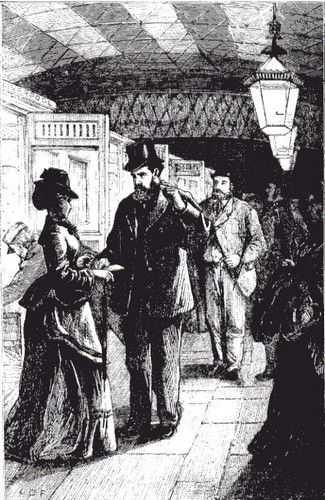 The Way We Live Now: Lionel G. Fawkes, "'You, I think, are Miss Melmotte'", Chapter 50, The Journey to Liverpool
The Way We Live Now: Lionel G. Fawkes, "'You, I think, are Miss Melmotte'", Chapter 50, The Journey to Liverpool
For Sunday,
Oct 10: Installments 1 & 2: Chapters 1-10
Oct 17: 3 & 4: Chapters 11-20
Oct 24: 5 & 6, Chs 21-30
Oct 31: 7 & 8, Chs 31-40
Nov 7: 9 & 10, Chs 41-50
End of Volume I
Nov 14: Installments 11 & 12 , Chs 51-60
Nov 21: 13 & 14, Chs 61-70
Nov 28: 15 & 16: Chs 71-80
Dec 5: 17 & 18: Chs 81-90
Dec 12: 19 & 20: Chs 91-100
Dec 19: Davies's TWWLN, Parts 1 and 2
Dec 26 ; Davies's TWWLN, Parts 3 &4
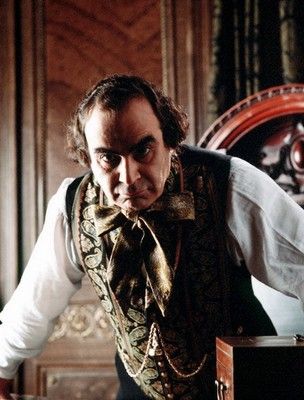 From 2001 The Way We Now, Melmotte (David Suchet), screenplay Andrew Davies, directed by David Yates, produced by Nigel Stafford-Clark
From 2001 The Way We Now, Melmotte (David Suchet), screenplay Andrew Davies, directed by David Yates, produced by Nigel Stafford-Clark
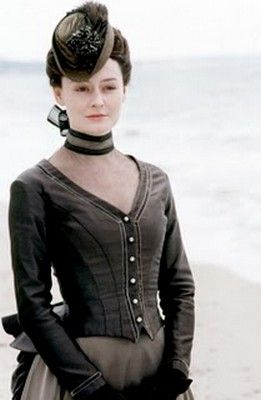 From 2001 The Way We Now, Mrs Hurtle (Miranda Otto), screenplay Andrew Davies, directed by David Yates, produced by Nigel Stafford-Clark
From 2001 The Way We Now, Mrs Hurtle (Miranda Otto), screenplay Andrew Davies, directed by David Yates, produced by Nigel Stafford-Clark
Next up: Trollope's Life of Cicero, Lord
Palmerston, and How the Mastiffs Went to Ireland
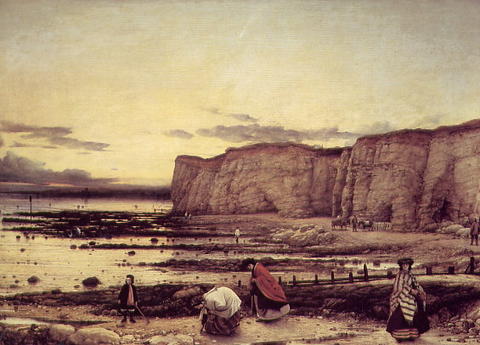 William Dyce (1806-64), Pegwell Bay, A Recollection of October 5th, 1858 William Dyce (1806-64), Pegwell Bay, A Recollection of October 5th, 1858
In fall 2009, we had an autumnal season on Scott. a sort of retrospective where people have been reading
whatever novel they want (a choice of two novels from Scott's career divided into early, middle and later novels), a biography (choices will be discussed at the time) or a literary study, and we hope even to discuss Scott's poetry and his own criticism. I've
ead and summarized John Sutherland's ground-breaking Life of Scott, and put a copy of my review on my website.
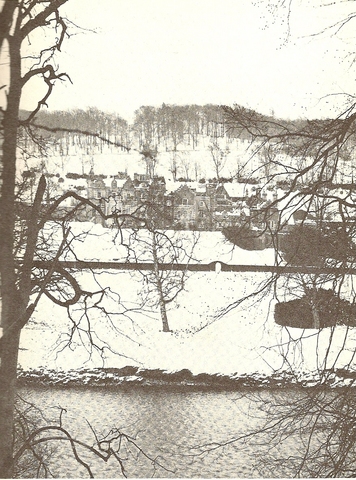 Scott's Abbotsford in Snow, modern photo taken before 1972
Scott's Abbotsford in Snow, modern photo taken before 1972
This December 2009 into February 2010 we had six weeks of Victor Hugo. People are invited to read whatever novel
they would like; also poetry, plays, biographies or Graham Robb's literary biography. It has in fact turned out fot eh
a reading and discussion of his masterpiece, Les Miserables (translations chosen are by Norman Denny
or Julie Rose), along with the various film adaptations, to be followed by The Last Days of a Condemned Man.
April we had a Chekhov (his short stories, plays, novellas) month; I plan to read his Shooting
Party. The suggested biography is Henry Troyat's. Then around June we turned to Turgenev's short stories and novels. One useful
anthology mentioned is First Love and Other Stories
This summer of 2010 we read Edith Wharton's Age of Innocence and Henry James's Roderick Hudson and have now turned to two biographies,
Sheldon Novick's two volume The Young Master and The Mature Master as well as Fred Kaplan's The
Imagination of Genius.
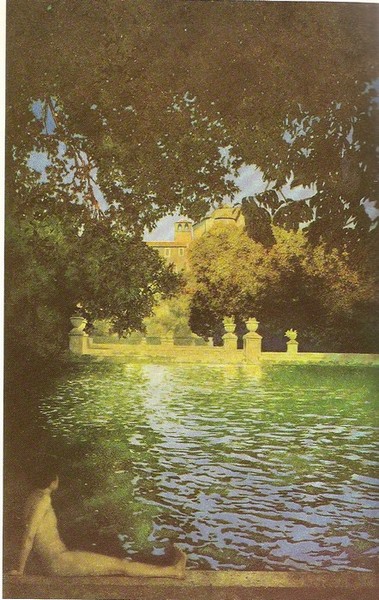 The Fountain at the Ville d'Este Gardens, Tivoli, from Wharton's Italian Villas and Gardens
The Fountain at the Ville d'Este Gardens, Tivoli, from Wharton's Italian Villas and Gardens
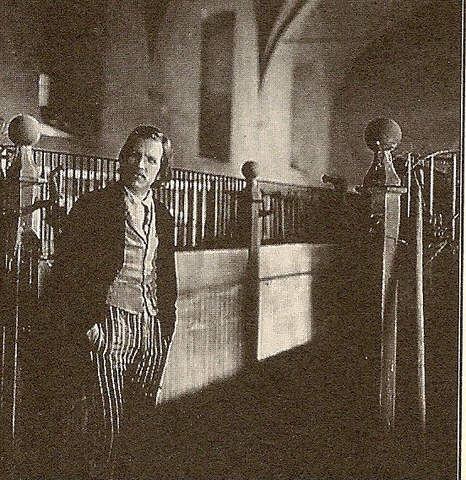 Martin Donovan as Ralph Touchett, the above and this still from the 1986 The Portrait of a Lady, directed
by Jane Campion, screenplay Laura Jones, produced by Steve Golin
Martin Donovan as Ralph Touchett, the above and this still from the 1986 The Portrait of a Lady, directed
by Jane Campion, screenplay Laura Jones, produced by Steve Golin
The reader will find in my book, Trollope on the 'Net and in the following documents a record of the conversations members have had on Trollope's fiction and non-fiction. They are set up in chronological order and keyed to the chapters in Trollope's books so that they take the form of a story of reading experiences exchanged, debated, and meditated on specific texts over a course of weeks or months. Read in consecutive order they form close readings of the texts in question.
Trollope on the 'Net
A revolutionary review
of Trollope and why we read him: by Tyler Tichelaar, novelist, scholar.
My blog contextualizing Trollope on the 'Net
- Trollope's Short Stories
(1997-98)
- Tales of All Countries
- Of Love, Courtship, and Marriage
- Irish Tales
- Christmas Stories
- Archibald Green Stories
- Burlesques
- An Editor's Tales
Essays and Postings on Anthony Trollope's Non-Fiction By members:
Michael Powe's Website, trollope.org (1997-98), includes
selections of postings, threads, and essays from group conversations on
- The Barsetshire Chronicles: Barchester Towers,
Dr Thorne, The Vicar of Bullhampton, The Way We Live
Now, and the completed unedited discussions of The Claverings, He
Knew He Was Right, and An Autobiography (upon
which Chapters 2, 5 and 8 were partly based);
- Trollope's short stories;
- Trollope's Family and Reputation, Biographies, and his Freemasonry
Ellen Moody's Trollope on the Net is in part a history of a series of group reads
she and Michael Powe participated in on a mailing list run by Elizabeth Thomson which was
simply called the Trollope list and ran on Majordomo software (its successor, which has a
different listowner, may be found on yahoo.com). The book partly tells the story of the reads and discussions that occurred there between 1995 and 1997 of The Macdermots of Ballycloran, He Knew He Was Right, The
Claverings, Lady Anna, An Autobiography, and Can You
Forgive Her? in the context of the Palliser cycle treated as as roman fleuve.
It also includes separate interwoven chapters on all Trollope's Irish fiction, his novellas (including Kept in the
Dark, Nina Balatka, The Golden Lion of Granpère, The
Fixed Period), the original illustrations to Trollope's novels and autobiography considered
as a genre related to fiction and as practised in the 19th century.
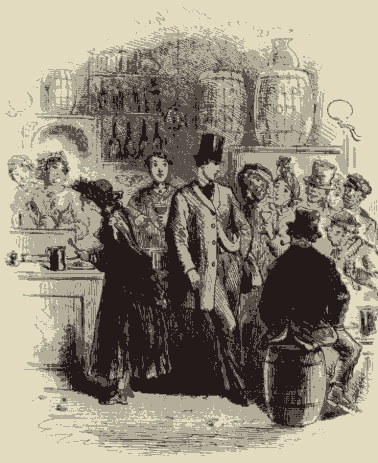 Hablôt Browne (Phiz), Can You Forgive Her?
Hablôt Browne (Phiz), Can You Forgive Her?
A Few Rules of the Game
In order to prevent discomfort, hurt feelings, trolling, flame
wars and other disruptions on our list, to secure the courteous
and cordial atmosphere we desire for all, and to ensure that this
list remains a place where serious semi-scholarly talk be
sustained, as moderator I ask everyone who joins the list to read and to abide by the following rules:
- The purpose of this list is not a matter for debate. A listowner
opens a list with a given subject matter and audience in mind.
While this list is meant for all people who love to
read and are interested in any and all aspects of 19th century
culture, its goal is to have serious discussions of the work
of Anthony Trollope and his contemporaries in the context of the
culture and history of the 19th century, and of modern scholarship
and artistic approaches to it. It is intended for people who feel
comfortable discussing Trollope and his contemporaries in depth.
- No personal attacks or flame wars. Personal attacks include
speculations about the motives, personal problems and/or
intellectual deficiencies, background, or educational level
of someone else and all veiled taunts and snide remarks.
- Please refrain from characterizing the kind of posts someone
sends (long, short, high-toned, low-toned, high-, middle-, or low-browed, academic, solemn, intense, stupid, ignorant,simple-
minded, deep, angry, using profanity &c &c) with
a view to discussing the kind of person the poster is or the kind of postings he or she writes. You can argue with content of the posting
as regards Trollope and his contemporaries but not the attitudes of the poster as regards him or herself or the status you imagine the poster to have in "real" life; that is to discuss the listmember.
To argue with the kind or nature of a post itself is also to bring in
the personality and values of the person posting it. That is why
arguing against literary theory always ends in flame wars: to bring
this up is to argue against the identity of
someone else. The content about our 19th century terrain is fair game,
not other members. If a posting is overly long, if someone takes
to sending many tiny messages, or if you feel someone has insulted you in some way, get into contact with one of the listowners and she
will discuss it with the member offlist.
- Similarly, please refrain from categorizing "other groups" of people
on the list as different from a group to which the individual presumes
he or she belongs -- often such groupings are in the mind of
the poster and don't correspond to realities on lists
at all. Our list is a diverse place; anyone can join; right now
it is made up of teachers, readers and students, readers and
people interested in Trollope and his contemporaries, professional and
non-professional people. To begin to categorize one another is to
invite factionalism and stigmatizing, and takes us down the road to
discomfort and reified conflicts between groups
- No public corrections of other people's spelling, grammmar,
style, tone or other formal failures on list. If you genuinely
want to aid someone not to make a mistake, get into contact
with him or her offlist.
- No one is to discuss anyone else's personality
or behavior in front of all the members of the list as if that person
weren't there. If you do this, you will be politely told to desist;
if you do not desist, you will be unsubscribed. We also ask that members not badger anyone for
a reply. If, after
you have tried to elicit a reply for a second time, someone
does not answer your objection for whatever reason, leave
the person alone.
- Members are invited to propose reading modern historical novels
set in the 19th century and close film adaptations of books
by Trollope and all other 19th century writers.
Everyone is invited to discuss mention movies, TV
adaptations, documentaries and radio or other non-print media
which directly relate to our subject matter. But we discourage
lengthy discussion of non-print media, movies, TV
adaptations, radio shows and famous personalities which
have nothing to do with Trollope or the 19th century. This is not
meant to be a list for chat and gossip.
- No attachments. We have set the list up
in such a way as to discard them, but don't try to put one
on. Present your message as part of your regular text.
- Please use clear subject headings, do not use "spoiler" warnings, and
do not simply hit the "reply" key when sending a posting.
You can preface a posting warning the reader that your discourse
necessitates your telling something from the end of a book the
group is reading or details from books the group as a whole
has not read. It is assumed that people coming onto Trollope-l have some serious interest in Trollope, that they would want to read his books far more than one time, and much of the talk assumes a familiar knowledge with Trollope's most famous books (the Barsetshire and Palliser ones). In fact, on this list we welcome
details from books we have not read, reviews, summaries,
critical discussions of things as ways of whetting appetites
for further reading ourselves. If you just hit "reply," the header
becomes detached from your subject; it also creates a trail of repeats that
make the digests into a mess that becomes difficult to read.
- No ranting against or bashing authors, characters,
art, periods, literary theory, specific books or kinds of books.
- Finally, when you post, please sign your name (a given and last name, not an obvious or
unreal pseudonym or net handle). This makes
it easier for other listmembers to reply and helps build a sense of
community and accountability among the members of the list.
Trollope19thCStudies archives are located in several places: 1) at Michael Powe's website;
and 2)yahoo archives online; 3) through Google; -- plus of course right here!.
|
